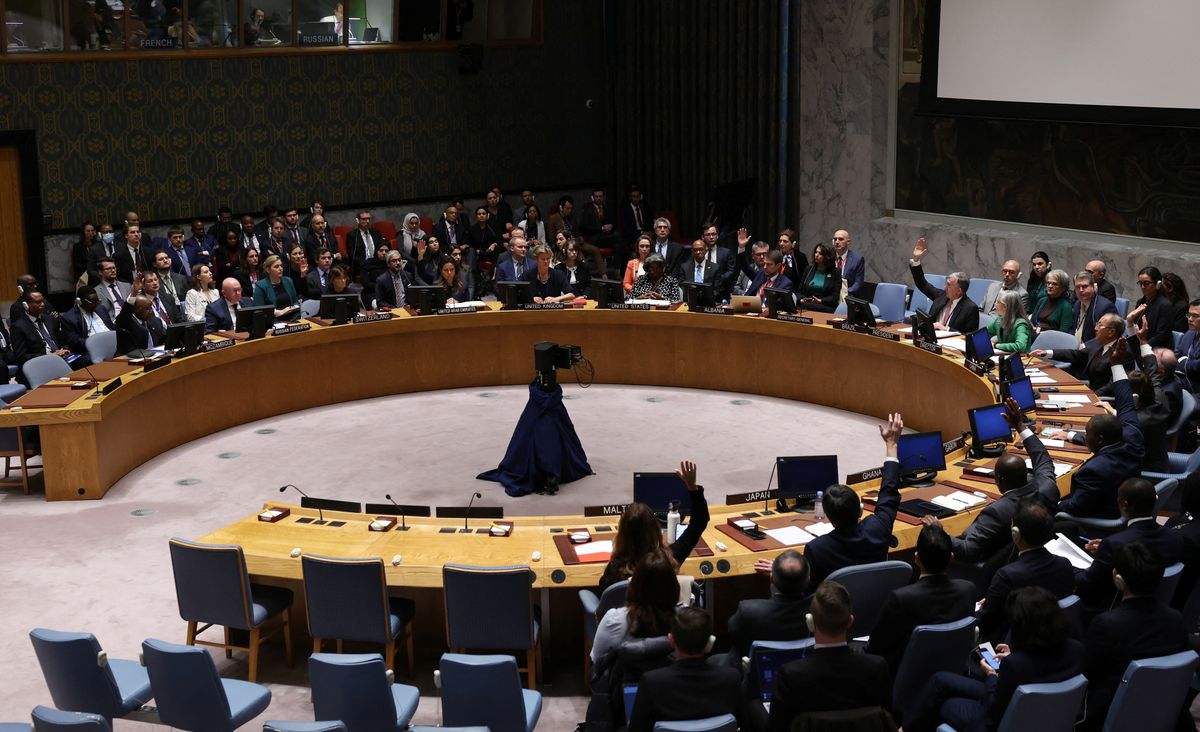The US vetoes UN Security Council Israel-Palestine resolution for “humanitarian pause”
With escalating violence in the Hamas-Israel conflict, the humanitarian situation in Gaza has become desperate.

A few minutes every morning is all you need.
Stay up to date on the world's Headlines and Human Stories. It's fun, it's factual, it's fluff-free.
The backstory: With escalating violence in the Hamas-Israel conflict, the humanitarian situation in Gaza has become desperate. Last week, Israel completely sealed off the territory, not allowing aid to enter through the Egypt-Gaza Rafah crossing, either. The UN has referred to the situation in the territory as an “unprecedented catastrophe.”
After hundreds of people were killed in a hospital blast on Tuesday (and hundreds more injured), civilian suffering has only gotten worse. The estimated death toll in Gaza before the hospital was hit was over 3,000, with over 12,500 people estimated to be injured – numbers that are continuing to rise. Hospitals are running on generators, with electricity to Gaza being cut off by Israel – Gaza’s own power plant shut down last week from lack of fuel. And, running critically low on medical supplies, doctors have reportedly been forced to operate on patients without anesthesia. All of that is not even to mention the lack of food and clean water in the enclave.
More recently: Earlier this week, US President Joe Biden visited Israel to show US support. In his talks with Israeli Prime Minister Benjamin Netanyahu, he also pushed for Israel to allow humanitarian aid into Gaza. Israel then said it “wouldn’t thwart” humanitarian relief deliveries through the Egypt-Gaza border, as long as it didn’t reach Hamas. That aid is supposed to start moving on Friday, October 20. It’s not clear how far it will go, and the World Health Organization (WHO) says that it’s just a “start” to getting people what they need.
Meanwhile, the 15 members of the UN Security Council have been working on a resolution to open up more aid to Gaza civilians. Brazil drafted a resolution that called for humanitarian access and protection of civilians in Gaza and the immediate release of Israeli hostages by Hamas. It also condemned Hamas’s terrorist attack on Israel. The resolution demanded a “humanitarian pause” to fighting on both sides and for Israel to lift last weekend’s order for civilians to evacuate northern Gaza. It should’ve been voted on days ago, but it was delayed twice. As its biggest ally, the US has a history of supporting Israel in the UN when it comes to resolutions that go against Israel’s general interests.
The development: On Wednesday, 12 members of the UN Security Council voted to pass the resolution. The UK and Russia abstained. But, the US vetoed it as one of the five permanent members with the power to do so, saying it rejected the resolution for not mentioning Israel’s right to self-defense. After the veto, the US has been on the receiving end of international criticism.
Other countries have called it out for double standards after continuing to condemn Russia for suspending Security Council action when it comes to Ukraine. At the same time, UN Secretary-General Antonio Guterres continued to call for an immediate ceasefire to allow for the release of hostages and to get humanitarian aid into Gaza.
Key comments:
"We are on the ground doing the hard work of diplomacy," US Ambassador to the UN, Linda Thomas-Greenfield, told the 15-member council after the vote. "We believe we need to let that diplomacy play out. Yes, resolutions are important. And yes, this council must speak out. But the actions we take must be informed by the facts on the ground and support direct diplomacy efforts. That can save lives. The council needs to get this right," she said.
“The final result is nothing short of unbelievable,” said Zhang Jun, China’s ambassador. “The Council must not stand on its hands.”
“The Security Council of the United Nations is unable to say the one thing that truly matters: stop the bloodshed,” said Palestinian representative at the UN, Riyad Mansour.




Comments ()